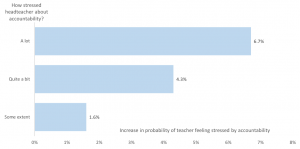How is school accountability linked to teacher stress?
By IOE Editor, on 18 March 2021
England’s school system has a high level of accountability – and a high level of accountability-related stress.
By John Jerrim
This blog post reports findings from Nuffield Foundation-funded research conducted into teacher health and wellbeing.
It is no secret that many in education dislike certain aspects of England’s school accountability system. Indeed, accountability is often blamed for causing high-levels of stress among the teacher workforce.
Yet we know surprisingly little about the link between accountability and teacher wellbeing.
This blogpost – based upon a new research paper I am publishing with colleagues today – looks at international evidence on this issue from TALIS 2018. (TALIS is the OECD’s Teaching and Learning International Survey.)
Do high accountability school systems have teachers who are more stressed about this aspect of their job?
As part of TALIS, teachers were asked how much stress was caused by different aspects of their job. This included “being held responsible for pupil achievement” – i.e. accountability.
In another international survey, PISA, headteachers were asked various questions about accountability, such as how school assessment data is used, whether school examination results are made publicly available (e.g. school league tables) and if there is a school inspectorate (e.g. Ofsted).
Using this data, we have created a “school accountability” scale, capturing the extent of school accountability systems used across the world. Countries receive a score between -1 and +1, where a higher number corresponds to more accountability measures.
In the chart below, the extent of accountability in the school system is plotted along the horizontal axis and the percentage of teachers who feel stressed about accountability on the vertical axis.
There are two key points of note.
First, England sits towards the top-right hand corner: we have lots of accountability in our school system, and also a lot of accountability-driven stress among teachers. (68% of teachers in England report feeling accountability-related stress, compared to a cross-country average of around 45%).
Second, there is a positive cross-national correlation, though this is relatively weak (the correlation coefficient is around 0.3). In other words, teachers do tend to be more stressed about accountability in countries where there is more accountability within the school system. Yet this relationship is not that strong – and certainly not deterministic.
For instance, there are countries with systems of school accountability similar in extent to England’s – most notably New Zealand and the United States – where teachers are a lot less likely to be stressed by this part of their job.
Now, as I have written before, results from such cross-national analyses need to be treated very carefully. The chart above should be treated as a conversation starter, rather than being used as ‘proof’ of anything more.
It does nevertheless raise important questions about the pros and cons of England’s current system of school accountability. In particular, do we have the right balance between quality assurance of schools and ensuring that this does not stress teaching staff out?
How is accountability-induced stress among teachers linked to the stress felt by headteachers?
Within our paper, we also consider how stress-induced by accountability is shared among staff within the same school.
For instance, do teachers feel more stressed about accountability when their boss – headteachers – feel stressed about this part of the job as well?
As the chart below, which relates to all TALIS countries, indicates, the answer is to some extent ‘yes’. Specifically, in comparison to teachers whose head does not feel stressed by accountability at all, teachers are around seven percentage points more likely to feel stressed by accountability if their headteacher says they feel ‘a lot’ of stress about this part of their job as well. To put this figure into context, on average across countries, approximately 45% of teachers say that they feel stressed by accountability.
So, there is indeed a relationship. But the difference is not particularly strong.
Accountability-induced stress is – to some extent – concentrated within particular schools.
Our analysis has also considered whether teachers are more likely to feel stressed about accountability if their colleagues (i.e. other teachers within their school) feel stressed by accountability as well.
Here, we found strong evidence of a positive relationship. For instance, again looking across all TALIS countries, a teacher is twice as likely to say that they feel stressed by accountability if their colleagues also feel stressed by this part of their job.
In other words, there are some schools where the stress caused by accountability is a particularly big problem that needs to be addressed.
We still need to know much more
So, England is a high-accountability, high-accountability stress country. We know there is a modest link between the stress of headteachers and the stress of their staff. And, to some extent, the problem of accountability-induced stress is clustered among teachers working within specific schools.
Yet, for all the talk about how school league tables and Ofsted inspections negatively affect teachers, we still know relatively little about the pros and cons of England’s extensive system of school accountability.
With the recent pause in many aspects of the school accountability system in England due to the Covid-19 crisis, now could be the ideal time for policymakers to take a moment and consider whether we have the right quality assurance mechanisms in place within our schools.
The project has been funded by the Nuffield Foundation, but the views expressed are those of the authors and not necessarily the Foundation. Visit www.nuffieldfoundation.org.
 Close
Close




